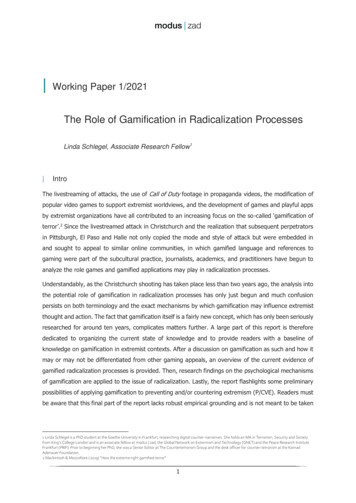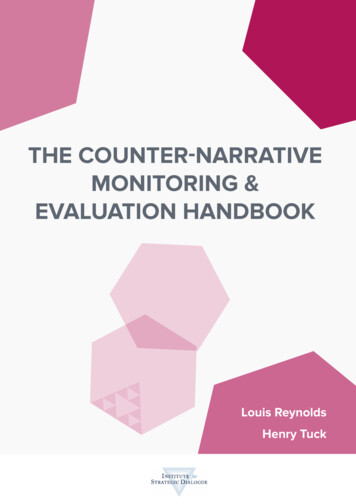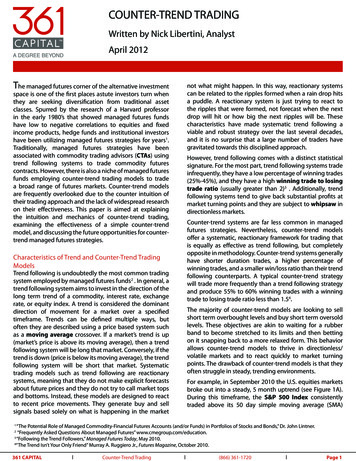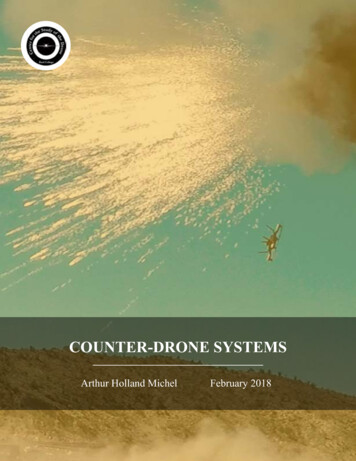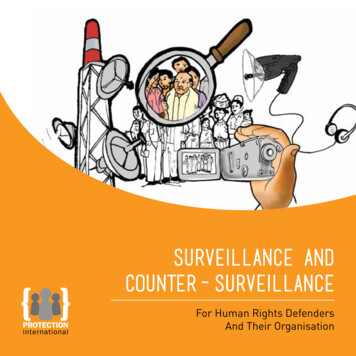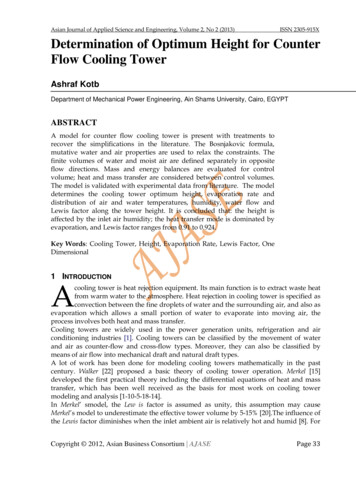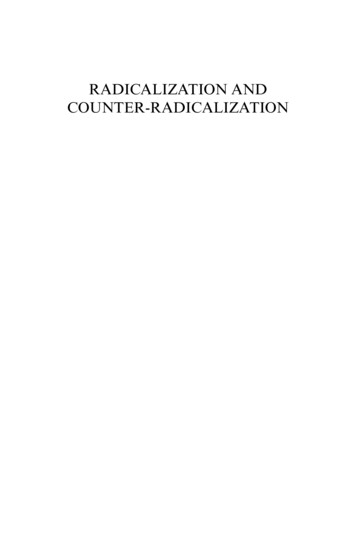
Transcription
RADICALIZATION ANDCOUNTER-RADICALIZATION
SOCIOLOGY OF CRIME, LAW ANDDEVIANCESeries Editors: Mathieu Deflem and DerekM. D. Silva(Volumes 1–5: Jeffrey T. Ulmer, Volumes 6–23:Mathieu Deflem)Previous Volumes:Volume 6: Ethnographies of Law and Social Control, edited by Stacey Lee Burns, 2005Volume 7: Sociological Theory and Criminological Research, Views from Europe andUnited States, edited by Mathieu Deflem, 2006Volume 8: Police Occupational Culture: New Debates and Directions, edited by MeganO’Neill, Monique Marks and Anne- Marie Singh, 2007Volume 9: Crime and Human Rights, edited by Stephan Paramentier and ElmarWeitekamp, 2007Volume 10: Surveillance and Governance: Crime Control and Beyond, edited byMathieu Deflem, 2008Volume 11: Restorative Justice: From Theory to Practice, edited by Holly Ventura Miller,2008Volume 12: Access to Justice, edited by Rebecca Sandefur, 2009Volume 13: Immigration, Crime and Justice, edited by William F. McDonald, 2009Volume 14: Popular Culture, Crime and Social Control, edited by Mathieu Deflem, 2010Volume 15: Social Control: Informal, Legal and Medical, edited by James J. Chriss, 2010Volume 16: Economic Crisis and Crime, edited by Mathieu Deflem, 2011Volume 17: Disasters, Hazards and Law, edited by Mathieu Deflem, 2012Volume 18: Music and Law, edited by Mathieu Deflem, 2013Volume 19: Punishment and Incarceration: A Global Perspective, edited by MathieuDeflem, 2013Volume 20: Terrorism and Counterterrorism Today, edited by Mathieu Deflem, 2015Volume 21: The Politics of Policing: Between Force and Legitimacy, edited by MathieuDeflem, 2016Volume 22: Race, Ethnicity and Law, edited by Mathieu Deflem, 2017Volume 23: Homicide and Violent Crime, edited by Mathieu Deflem, 2018Volume 24: Methods of Criminology and Criminal Justice Research, edited by MathieuDeflem and Derek M.D. Silva, 2019
SOCIOLOGY OF CRIME, LAW AND DEVIANCEVOLUME 25RADICALIZATION ANDCOUNTERRADICALIZATIONEDITED BYDEREK M.D. SILVAKing’s University College, CanadaandMATHIEU DEFLEMUniversity of South Carolina, USAUnited Kingdom – North America – JapanIndia – Malaysia – China
Emerald Publishing LimitedHoward House, Wagon Lane, Bingley BD16 1WA, UKFirst edition 2020Copyright 2020 Emerald Publishing LimitedReprints and permissions serviceContact: permissions@emeraldinsight.comNo part of this book may be reproduced, stored in a retrieval system, transmitted inany form or by any means electronic, mechanical, photocopying, recording or otherwisewithout either the prior written permission of the publisher or a licence permittingrestricted copying issued in the UK by The Copyright Licensing Agency and in the USAby The Copyright Clearance Center. Any opinions expressed in the chapters are thoseof the authors. Whilst Emerald makes every effort to ensure the quality and accuracy ofits content, Emerald makes no representation implied or otherwise, as to the chapters’suitability and application and disclaims any warranties, express or implied, to their use.British Library Cataloguing in Publication DataA catalogue record for this book is available from the British LibraryISBN: 978-1-83982-989-5 (Print)ISBN: 978-1-83982-988-8 (Online)ISBN: 978-1-83982-990-1 (Epub)ISSN: 1521-6136 (Series)
CONTENTSList of Tables viiAbout the Contributors ixIntroduction: Deciphering (Counter-)RadicalizationDerek M.D. Silva and Mathieu Deflem 1PART ITHEORETICAL AND CONCEPTUAL ADVANCESChapter 1 Does Deradicalization Work?John Horgan, Katharina Meredith and Katerina Papatheodorou 9Chapter 2 Navigating Radicalization Concepts:A Role for the Harm PrincipleKeiran Hardy 21Chapter 3 Radicalization as Transformative Learning:A Theoretical and Illustrative ExplorationAlex Wilner and Claire-Jehanne Dubouloz 37Chapter 4 Advances in Violent Extremist Risk AnalysisPaul Gill, Zoe Marchment, Sanaz Zolghadriha,Nadine Salman, Bettina Rottweiler, Caitlin Clemmowand Isabelle Van Der Vegt 55PART IISTATE AND CIVIL SOCIETYChapter 5 Counter-Radicalization as Civic IntegrationTherese O’Toole 77Chapter 6 The Role of State Violence in the Adoption ofTerrorismStephen Chicoine 95v
viContentsChapter 7 The Securitization of Muslim Civil Society inCanadaFahad Ahmad 115Chapter 8 Countering Violent Extremism, Safeguarding andthe Law: A Practitoner’s Perspective on Protecting Young andVulnerable People from ExploitationCarys Evans 135PART IIITHE ONLINE SPACE AND RADICALIZATIONChapter 9 Clearing the Smoke and Breaking the Mirrors:Using Attitudinal Inoculation to Challenge OnlineDisinformation by ExtremistsKurt Braddock 155Chapter 10 Learning to Hate: Explaining Participation inOnline ExtremismJames Hawdon and Matthew Costello 167Chapter 11 Hatred She Wrote: A Comparative Topic Analysisof Extreme Right and Islamic State Women-Only ForumsAyse Lokmanoglu and Yannick Veilleux-Lepage 183PART IVFORMER EXTREMISTS, PREVENTION,AND PUNISHMENTChapter 12 Former Extremists in Radicalization andCounter-Radicalization ResearchRyan Scrivens, Steven Windisch and Pete Simi 209Chapter 13 Examining “Prevent” from a FormerCombatant PerspectiveTom Pettinger 225Chapter 14 Engagement, Desistance, and Revolt: What DoWe Know about Terrorists who Turn into Informants?Stefano Bonino 243Chapter 15 “We Wouldn’t Let Known Terrorists Live Here”:Impediments to Radicalization in Western Canadian PrisonsWilliam J. Schultz, Sandra M. Bucerius and Kevin D. Haggerty 259Index 277
LIST OF TABLESChapter 10Table 1. Univariate Statistics. Table 2. Logistic Regression of Producing Online Hate onSocial Structural Variables. Table 3. Logistic Regression of Producing Online Hate onSocial Structural Social Learning Variables. 175175176Chapter 11Table 1. Cluster Categories Comparison and Prominence. 192Chapter 13Table 1. ERG 22 “Risk Factors” (NOMS, 2014, pp. 3–4). vii230
This page intentionally left blank
ABOUT THE CONTRIBUTORSFahad Ahmad, School of Public Policy and Administration, Carleton University(Canada), studies how the work of community organizations that provide socialand economic support to immigrant and diaspora Muslim communities mitigatesradicalization. He is a Pierre Elliot Trudeau Foundation Scholar who also works asa Consultant, Researcher, and Program Evaluator for community-based initiatives.Stefano Bonino, Independent Researcher, specializes in security, migration, andcounter-terrorism. He is the author of Muslims in Scotland: The Making ofCommunity in a Post-9/11 World (Edinburgh University Press, 2016), which wasshortlisted for the 2017 Saltire Society Research Book of the Year Award. Hereceived his Ph.D. at the University of Edinburgh and previously worked at theUniversities of Birmingham, Durham, Northumbria, and Trento.Kurt Braddock, School of Communication, American University (USA), specializesin the effects of specific types of communication in the processes surroundingthe use of terrorism. His work evaluates the persuasive mechanisms of terroristrecruitment and radicalization practices and how those practices can be challenged. He is the author of the forthcoming Weaponized Words: The Strategic Roleof Persuasion in Violent Radicalization and Counter-Radicalization (CambridgeUniversity Press, 2020).Sandra M. Bucerius, Department of Sociology, University of Alberta (Canada),specializes in prisons, police organizations, and marginalized street and newcomercommunities. She conducts research designed to understand criminal justice institutions through the perspectives of both those who work in them and those whoencounter them, particularly those marginalized by factors related to race, gender, social class, and addictions, and has published widely on those topics.Stephen Chicoine, Department of Sociology, University of South Carolina(USA), specializes in the spread and diffusion of terrorism across time and spaceand the role of state violence in terrorism. His work can be found in SociologicalForum, Development and Society, The Handbook of Social Control (Wiley), andthe Encyclopedia of Criminology and Criminal Justice (Springer).Caitlin Clemmow, Department of Security and Crime Science, University CollegeLondon (UK), researcher lone-actor terrorism. She is a first year Ph.D. student atUCL’s Department of Security and Crime Science completing a research projectaiming to develop a comprehensive typology of lone-actor terrorists.ix
xAbout the ContributorsMatthew Costello, Department of Sociology, Clemson University (USA), specializes in online crime and deviance and violent extremism. His current researchexplores online extremism in domestic and cross-national settings. It explores factors related to exposure to, targeting by, and production of online extremist material. His research has been published in respected journals in the field of sociologyand criminology.Mathieu Deflem, Department of Sociology, University of South Carolina (USA),specializes in the sociology of social control, terrorism, policing, sociology of law,and sociological theory. He is the author of four books, including The Policing ofTerrorism (Routledge, 2010) and Sociology of Law (Cambridge University Press,2008).Dr. Dubouloz, has been a Professor of Occupational Therapy at the School ofRehabilitation Sciences at the University of Ottawa (Canada) for more than30 years. Previously, she enjoyed a 10-year career as a clinical therapist at theMontreal Gingras-Lindsay Rehabilitation Institute. She has been a key player inthe development of Rehabilitation Sciences education in Canada. Currently sheis Professor Emeritus. Her latest book, Transformative Physical Rehabilitation:Thriving After a Major Health Event, will be published by the University ofOttawa Press in 2020.Carys Evans, Director of Programmes and Impact, ConnectFutures (UK), specializes in youth engagement, social integration, and community-led development.Currently, completing her Master’s degree in Terrorism and Political Violence atthe University of Birmingham. She is focusing on a range of topics includingFar-Right extremism in the UK, gender in terrorism and CVE.Paul Gill, Department of Security and Crime Science, University CollegeLondon (UK), is an expert in the causes and patterns of terrorism. His publishedresearch demonstrates the heterogeneous profiles of terrorists, their developmentalpathways into terrorism, the behaviors that precede and underpin a terroristattack, how terrorists fit into a wider structure and how particular group influencescondition individuals to engage in acts of violence.Kevin D. Haggerty, Department of Sociology, University of Alberta (Canada),specializes in surveillance, governance, policing, and risk. He is a Killam ResearchLaureate and Editor of the Canadian Journal of Sociology. He has publishedwidely on the topics of prisons, surveillance, research ethics, policing, risk, andgovernance.Keiran Hardy, Griffith Criminology Institute, Griffith University (Australia), specializes in counter-terrorism law, countering violent extremism, radicalization,intelligence whistleblowing, and cyber-terrorism. He has published extensively oncounter-terrorism law and policy and comments regularly for Australian media.
About the ContributorsxiHe is the author of Law in Australian Society: An Introduction to Principles andProcess.James Hawdon, Department of Sociology, Virginia Tech (USA), investigates therole of communities in promoting, deterring, or reacting to crime and violence.His most recent work focuses on online communities and how pattern exposureto and participation in online extremism. He has published seven books or editedbooks and over 100 articles, book chapters, or research reports in the areas ofterrorism and violent extremism, criminology, and sociology.John Horgan, Department of Psychology, Georgia State University (USA),specializes in psychological issues in terrorism and political violence. He is aDistinguished University Professor and Director of the Violent ExtremismResearch Group. His work is widely published, and his books include ThePsychology of Terrorism.Ayse Lokmanoglu, Transcultural Conflict and Violence Initiative, Georgia StateUniversity (USA), specializes in media of violent extremist groups. She earnedher M.A. in Middle Eastern Studies from Harvard University and her B.A. inEconomics and Near Eastern Studies from Cornell University.Zoe Marchment, Department of Security and Crime Science, University CollegeLondon (UK), specializes in the spatial arrangement of terrorist targets. She isa Post-doctoral research associate with UCL’s Grievance Project. Her researchexamines the spatial decision-making of terrorist target selection, with a focus onlone-actors and Violent Dissident Republican activity.Katharina Meredith, Department of Psychology, Georgia State University (USA) isa Ph.D. researcher and a Research Associate in Georgia State University’s ViolentExtremism Research Group. Her research interests are inter-group and intragroup violence, online extremist propaganda and radicalization, group processesand group-exit, identity of current and former members, program development,and program evaluation.Therese O’Toole, School of Sociology, Politics and International Studies and theCentre for the Study of Ethnicity and Citizenship, University of Bristol, researchesMuslims and governance and the impact of the Prevent and Counter Extremismagendas on Muslim civil society in the UK. Her recent book (with John Holmwood)analyses allegations of a plot by Muslim extremists to infiltrate and Islamicise statefunded schools in Britain: Countering Extremism in British Schools? The Truthabout the Birmingham Trojan Horse Affair (Policy Press 2017).Katerina Papatheodorou, Department of Psychology, Georgia State University(USA), is a psychology Ph.D. researcher and Graduate Research Assistant in theViolent Extremism Research Group. Her research focuses on the psychology of
xiiAbout the Contributorsterrorism. Specifically, she is interested in understanding how and why people disengage from violent extremist groups.Tom Pettinger, Politics and International Studies, University of Warwick (UK),specializes in critical terrorism studies, risk, pre-emption, and radicalization. Hisprimary focus is the distinction between the sorts of behaviors associated withrisk through contemporary terrorism pre-emption, and the sorts of behaviorsdemonstrated by those convicted of terrorism offences in Northern Ireland.He has conducted over 50 research interviews with Prevent officials, Channel mentors,and Northern Irish former combatants.Bettina Rottweiler, Department of Security and Crime Science, University CollegeLondon (UK), researches violent extremism, radicalization, and terrorism. Hercurrent project explores the social ecology of radicalization in Germany.Nadine Salman, Department of Security and Crime Science, University CollegeLondon (UK), researches the application, validity, and reliability of terrorismrisk assessment tools used to estimate and prioritize the risks posed by potentialviolent extremists. Her previous academic research has focused on the impactof handcuffing suspects on deception detection in police interviews, and on therelationship between terrorism and drug trafficking.William J. Schultz, Department of Sociology, University of Alberta (Canada),specializes in studying the life experiences of prisoners and correctional officers.His research focuses on Canadian jails, interviewing prisoners and staff about howfentanyl and major security concerns impact everyday life experiences in the prisonsetting. He is a Vanier Canada and Pierre Elliott Trudeau Foundation doctoralscholar.Ryan Scrivens, School of Criminal Justice, Michigan State University (USA),specializes in terrorists’ and extremists’ use of the Internet, right-wing extremism, and computational social science. He is a Research Fellow at the VOX-PolNetwork of Excellence and a Research Associate at the International CyberCrimeResearch Centre.Derek M. D. Silva, Department of Sociology, King’s University College atWestern University (Canada), specializes in radicalization and violent extremism,policing, sport, and social control. His most recent work can be found in peerreviewed journals Crime, Media, Culture, Punishment & Society, SociologicalForum, Race & Class, and the Sociology of Sport Journal.Pete Simi, Department of Sociology, Chapman University (USA), specializesin extremist groups, violence, and radicalization. He has published more than50 peer reviewed manuscripts and book chapters and is co-author of an award- winning book manuscript, American Swastika: Inside the White Power Movement’sHidden Spaces of Hate.
About the ContributorsxiiiIsabelle Van Der Vegt, Department of Security and Crime Science, UniversityCollege London (UK), researches crime-solving problems, verbal deceptiondetection, and counter-terrorism. She is currently pursuing a Ph.D. at the UCLDepartment of Security and Crime Science, with a focus on understanding andpredicting targeted violence through linguistic threat assessment.Yannick Veilleux-Lepage, Institute of Security and Global Affairs, LeidenUniversity (the Netherlands). He previously worked as a Senior Researcher inthe Transcultural Conflict and Violence Initiative at Georgia State University.He holds a Ph.D. from the University of St Andrews.Dr. Alex Wilner, Associate Professor, Norman Patterson School of InternationalAffairs, Carleton University (Canada), species specializes in the application ofdeterrence theory to contemporary security issues like terrorism, radicalization, organized crime, cybersecurity threats, and proliferation, and ArtificialIntelligence. His books and volumes include Deterrence by Denial: Theoryand Practice (Cambria Press, 2020), Deterring Rational Fanatics (Universityof Pennsylvania Press, 2015), and Deterring Terrorism: Theory and Practice(Stanford University Press, 2012).Steven Windisch, Department of Criminal Justice, Temple University (USA),focuses on developmental and life-course criminology and symbolic interactionist perspective to examine the overlap between conventional criminaloffending and violent extremism. His interests are primarily at the individuallevel and focus on how the negative consequences of physical/psychologicaltrauma, identity formation, and interpersonal violence intersect with politicalextremism.Sanaz Zolghadriha, Department of Security and Crime Science, UniversityCollege London (UK), specializes in transnational organized crime networks,offending behavior, and law enforcement investigative practices. In 2014, shefounded the UCL Organised Crime Research Network, with which she is currentlyheavily involved.
This page intentionally left blank
INTRODUCTION: DECIPHERING(COUNTER-)RADICALIZATIONDerek M.D. Silva and Mathieu DeflemOver the past two decades there has been a notable increase in studies related toterrorism and counter-terrorism within the fields of sociology, criminology, law,and criminal justice. Scholars working in this area have laid the foundation for arich understanding of the complex social relations that contextualize terrorismand, perhaps even more relevant in the context of sociology and criminology,have documented the rise in social control measures seeking to prevent variousforms of terrorist activity. While social-scientific studies of terrorism have historically been primarily concerned with understanding the cognitive characteristics,actions, and behaviors of terrorists, sociological work aiming to conceptualize,theorize, and measure behaviors and activities that precede and follow terrorismand political violence have recently gained traction within the field.Contemporary scholarly discourse surrounding terrorism and counter- terrorism has been influenced by the rapid upsurge in focus on the pre- terrorismspace most often labeled under the heading of a “radicalization” process. Typicallyunderstood as an individual or group transitioning away from legitimate or lawful political, religious, or otherwise ideological belief toward unlawful violence,radicalization has become an increasingly studied topic in sociological and criminological research on terrorism. Dovetailing this trend has been an augmentedfocus on not only theorizing radicalization, but also on the development, uptake,and diffusion of social control strategies and practices aiming to intervene inthe radicalization process, most of labeled as counter-radicalization, countering violent extremism (CVE) or preventing violent extremism (PVE) strategies.Scholarly questions related to terrorism and counter-terrorism have thus shiftedaway from seeking to explain terrorism reactively to preemptive interventionsthat aim to understand and intervene in a process toward terrorist activity. Assuch, the epistemological orientation of social-scientific research on terrorism hasmoved significantly toward the pre-terrorism space, the study of which is largelyoccupied by scholars interested in radicalization and counter-radicalization.Radicalization and Counter-RadicalizationSociology of Crime, Law and Deviance, Volume 25, 1–5Copyright 2020 by Emerald Publishing LimitedAll rights of reproduction in any form reservedISSN: 1521-6136/doi:10.1108/S1521-6136202000000250211
2DEREK M.D. SILVA AND MATHIEU DEFLEMNot only have radicalization and counter-radicalization recently begun toenter the gaze of mainstream sociology, criminology, and criminal justice asobjects of investigation, the concept of radicalization also provides a growinggovernmental framework for understanding modern forms of terrorism and thelife-course trajectories of those engaging in terrorist activities. Furthermore, asagents of social control across Western jurisdictions have increasingly been focusing on counter-radicalization as part of their professional repertoire (Silva &Deflem, 2020), scholars must challenge the dynamics of practices associated withmodern counter-radicalization, CVE, and PVE strategies. Indeed, the emergenceof radicalization presents an opportunity for social scientists interested in bothterrorism and social control, but questions remain about how to develop such aresearch agenda (Silva, 2019). In this context, the present volume seeks to illuminate some of the contemporary advances in the field and possibilities for sociologists, criminologists, and other scholars interested in issues of criminal and socialjustice who want to pursue knowledge claims about new forms of social controlin the context of contemporary terrorism.Paralleling the growing interest in (counter-)radicalization has been a sustained critique of the very idea of labeling a complex process toward politicalviolence under the general marker of radicalization (Coolsaet, 2019; Kundnani,2012; Neumann, 2013; Sedgwick, 2010; Silva, 2018). From this perspective, thefocal point of social-scientific research on processes of radicalization should be,first and foremost, on the ways in which knowledge about transitions toward terrorism informs a myriad of public policies, intelligence and law enforcement strategies, and community interventions that impact certain individuals and groupspreemptive defined as risky (Silva & Deflem, 2020). Bridging the gap betweenscholarship on radicalization with studies on counter-radicalization, this body ofwork highlights the complex interconnectivity between the discourses and knowledges that shape our understanding of the radicalization process with the evolving ways that politicians and governments, law enforcement officials, communityleaders, civil society organizations, and other key stakeholders legitimize newpolicies, strategies, and practices seeking to counter it. It is thus important thatthis volume contributes to the deciphering of (counter-)radicalization within thefield to better understand the complex dynamics involved in the transition towardterrorism and the efforts deployed by various authorities to prevent it.This volume seeks to offer a useful contribution to the budding field of radicalization studies that intersects within the fields of sociology, law, criminology,and criminal justice today. This effort is certainly not meant as a condemnationor critique of contemporary or historical social-scientific research on terrorism ingeneral, but as an attempt to at once demonstrate the value of empirical researchthat gives primacy to the radicalization process and attempts to control it and,perhaps equally important, illuminate the rich, sophisticated, and rigorous scholarship that is being conducted in this area.The interdisciplinary nature of scholarship on radicalization that lies atthe nexus of crime, deviance, and social control is reflective of the development of contemporary scholarship on terrorism in general. The scope of thisvolume of Sociology of Crime, Law, and Deviance to focus on radicalization
Introduction3and counter-radicalization, as such, complements two volumes on the study of(counter-)terrorism published in this series over the past 15 years (Deflem, 2004,2015), bringing with it unique contributions toward the study of radicalizationas a legitimate unit of analysis. What the assembled authors hope to show is thatempirical studies of the so-called radicalization process and the myriad of socialcontrol strategies developed to intervene in it are valid, robust, and useful areas ofscholarly concern. To this end, our volume should nicely complement other relevant works in this area, such as the edited collections (Baker-Beall, Heath-Kelly, &Jarvis, 2014; Jackson, 2016), books (Alimi, Demetriou, & Bosi, 2015; Horgan,2009; Khosrokhavar, 2017; McDonald, 2018), and the numerous empirical articles (Kundnani, 2012; Neumann, 2013; Schmid, 2013; Sedgwick, 2010) the fieldof radicalization studies now relies on.The chapters in this book are divided into four parts, each representing cutting-edge scholarship being done in different areas of radicalization research.Part I brings together four chapters that in very different ways discuss theoreticaland conceptual advances and trends in the social-scientific study of (counter-)radicalization. John Horgan, Katharina Meredith, and Katerina Papatheodoroufirst address perhaps the most obvious question currently facing the field: doesderadicalization even work? Based on a descriptive account of findings withinthe field, they find that although scientific research on deradicalization is relatively new, there remains significant promise in emerging findings that supporta case for the effectiveness of deradicalization programs. Next, Keiran Hardyevaluates the merit of using John Stuart Mill’s harm principle to understanddebates surrounding the definitions of radicalization and deradicalization. Heargues that Mill’s harm principle is best applied when researchers and policymakers focus on the social aspects of radicalization over the psychological ones.Alex Wilner and Claire-Jehanne Dubouloz draw on Transformative Learningtheory to suggest a new and novel approach to the study of violent radicalization they call Transformative Radicalization. They argue that there remains someefficacy in understanding the cognitive and emotional process of change thatprepares and motivates an individual to pursue violent behavior, and that theTransformative Radicalization framework might provide a more nuanced understanding of the cognitive aspects of radicalization. Paul Gill, Zoe Marchment,Sanaz Zolghadriha, Nadine Salman, Bettina Rottweiler, Caitlin Clemmow, andIsabelle Van Der Vegt synthesize recent advances in violent extremist risk analysis. They find that the next generation of violent extremist risk assessment willnecessitate a focus upon process, barriers that challenge effective implementation,and a return to the human element of decision-making.Part II focuses on the role of the state and civil society in (counter-)radicalization. Therese O’Toole first explores the ever-evolving counter-radicalizationstrategy in the UK, called Prevent, and its increasing alignment with a muchlarger counter extremism agenda. O’Toole finds that this trend is evidence of abroader “civic turn” toward a narrow and increasingly restrictive conception ofboth integration and citizenship. Concentrating on the role of state violence inthe adoption of terrorism, Stephen Chicoine’s comparative-historical study ofanarchist, anti-colonial, New Left groups, and the Islamic State of Iraq and the
4DEREK M.D. SILVA AND MATHIEU DEFLEMLevant demonstrates the symbolic importance of state violence which is thoughtto provide a moral justification for numerous forms of terrorist activity. Next,Fahad Ahmad illuminates how Muslim communities and their representatives incivil society experience and negotiate the pressures from counter-radicalizationpolicies and practices. The author finds that while counter-radicalization policiesare legitimized by general references to risk governance and community-basedintervention, security discourses and practices continue to cast Muslim communities as suspect communities by constructing radicalization as a problem predominantly within Muslim communities. To end this part, Carys Evans presentsthe often-overlooked perspective of counter-radicalization practitioners withinthe field. She argues that practitioners are perhaps most equipped understandthe contextual factors leading individuals toward violent extremism and can thusprovide much more holistic tools to help prevent radicalization and, importantly,exploitation that might fuel extremism.In Part III, the focus shifts to how the online space operates as an increasinglyimportant arena for (counter-)radicalization research. Kurt Braddock studies theuse of attitudinal inoculation to challenge online disinformation propagated byextremists. He shows that despite the demonstrated efficacy of disinformationinoculation in general, its utility as a means of preventing the adoption of extremist beliefs and attitudes has yet to be sufficiently used in terrorism research. N
counter-terrorism. He is the author of Muslims in Scotland: The Making of Community in a Post-9/11 World (Edinburgh University Press, 2016), which was shortlisted for the 2017 Saltire Society Research Book of the Year Award. He received his Ph.D. at
